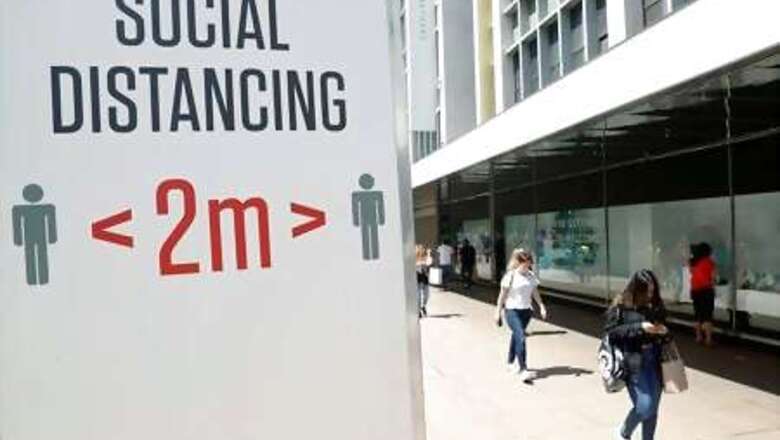
views
LISBON: By this time of year, Ilene Steele, 63, would usually have several trips behind her: one to visit family in the United States, a holiday in Italy, and a few day excursions in London, where she lives with her retired therapist husband Mike.
She’d be meeting friends for drinks and dinners, and enjoying manicures and pedicures with her daughter.
But not this year, even after lockdowns to counter the COVID-19 pandemic eased.
“We hardly go out, really,” the retired jeweller said. “We haven’t travelled. We thought about going to Greece – in a way it’s so appealing when you know there aren’t many tourists – but honestly, I’d feel pretty stupid if I died.”
As coronavirus cases rise again across Europe, spending data shows that fear of infection is deterring many wealthier consumers from splashing out. That spells trouble for retailers, luxury goods and leisure firms desperate to make up lost ground.
Between the risk of contracting the virus and the hassle of safety measures – from needing to put on paper socks before trying on trainers, to plastic screens dividing customers at the hairdresser – the fun of going out is lost, Steele feels.
“It’s like being at an operating table,” she said of images she’d seen of restaurants with barriers between diners. “I just wouldn’t enjoy that.”
Consumer transaction studies in countries including Britain, Denmark, France and Sweden show a pattern also seen in the United States: even as shops re-opened, high-income consumers kept their wallets zipped up.
British consumers earning 40,000 pounds ($51,250) or more after tax accounted for around 35% of spending in 2019, but 45% of the decline in the second quarter of 2020, a study of card transaction data by London Business School professor Paolo Surico and others showed.
“High-income groups spend in areas with a so-called ‘multiplier effect’ – non-essential services which employ lower-income groups,” Surico explained. “We want to engineer a situation where the young and the poor can save a bit more, and the older spend. But it’s happening the wrong way around.”
A comparative study by economist Asger Lau Andersen and others analysed spending from March to May by 860,000 consumers in Denmark, which imposed heavy coronavirus restrictions, and Sweden, which did not, but saw more infections.
The data showed spending in Denmark falling by just 4% more than in Sweden, and the elderly in Sweden actually cutting back more than the same age group in Denmark.
“Our interpretation is that the higher COVID incidence in Sweden made this high-risk group more cautious, despite stronger formal restrictions in Denmark,” Andersen said.
EARLY SIGNS
The resurgence of the virus, coupled with the winding down of furlough schemes in some countries, could further dampen demand on the lower-income side of the spectrum, particularly in sectors like grocery which until now have proved resilient.
Data scraped by analytics firm StyleSage from online clothing companies’ websites including Zara, Asos, Mango, Net-A-Porter and New Look in August showed 6-10% more products on discount than last year at 2-4% lower prices, as retailers pre-empt a fall in purchasing power.
Surico’s study of the UK, where a furlough scheme is being gradually phased out, showed those receiving government benefits returned to 2019 spending levels in June, while those not on government support remained 30% below last year’s levels.
Still, card transaction data from analytics firm Fable Data shows UK retail sales rose in August, recovering to just above 2019 levels by the end of the month. Consumers shifted spending from entertainment, leisure and transport towards cars, car maintenance, home improvements and sporting goods, it showed.
Grocery retailers are for now still benefiting from people eating in, rather than out. Sales of fresh fruit and vegetables in Germany at Aldi, Europe’s second largest grocery retailer, continue to be higher than usual, a spokeswoman said.
But in Portugal, where a steady rise in cases since June has led to partial lockdowns and a plunge in tourism threatening thousands of jobs, August figures already point to a contraction in grocery sales, according to Portuguese grocery network APED.
“Consumption doesn’t only go down because people are scared of going to shops,” head of APED Goncalo Lobo Xavier said. “It’s also their finances they are worried about.”
($1 = 0.7803 pounds)
Disclaimer: This post has been auto-published from an agency feed without any modifications to the text and has not been reviewed by an editor

















Comments
0 comment